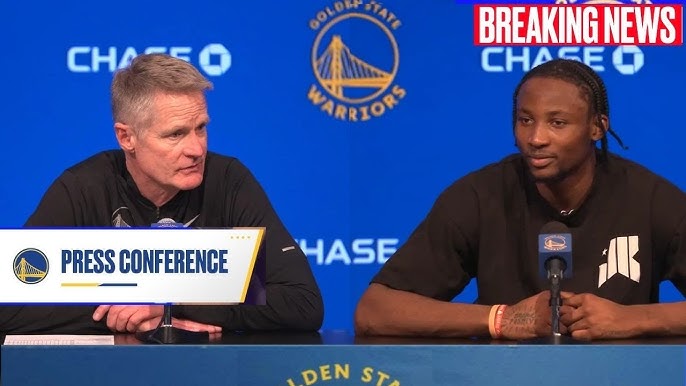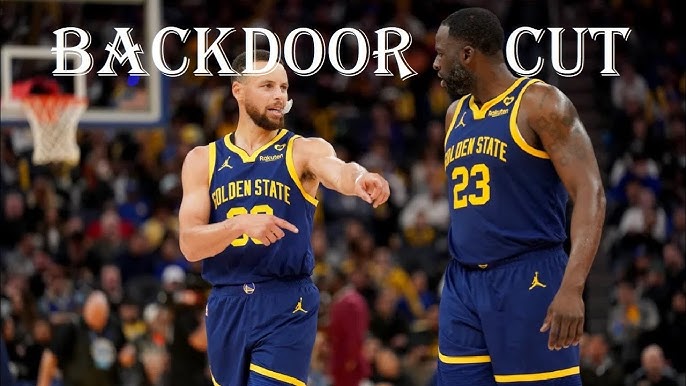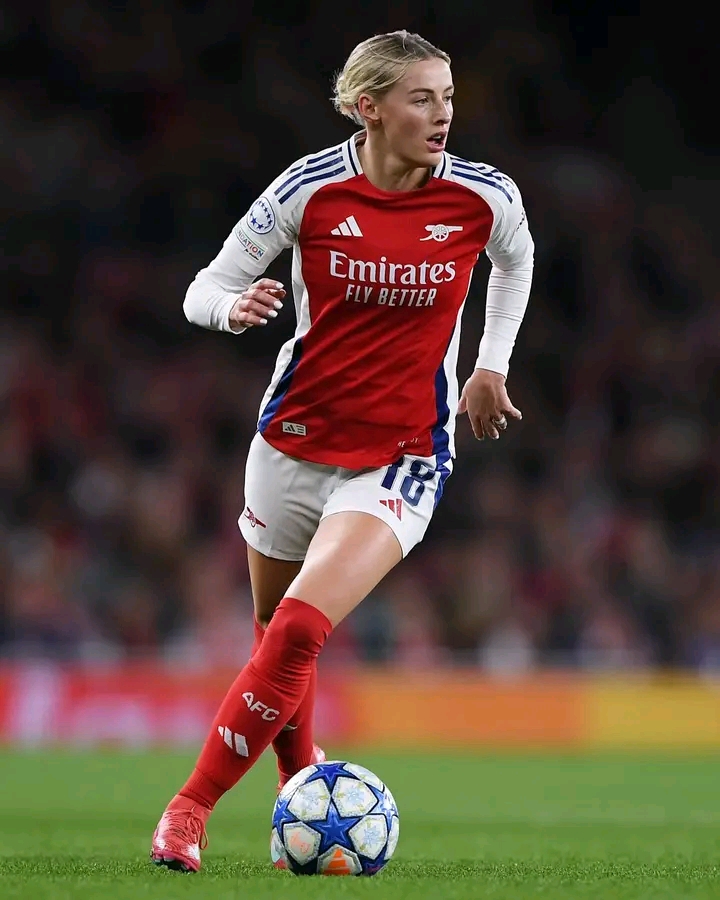
Statement by Jonathan Kuminga: We Depart After Warriors-Suns, I Because of…
The Golden State Warriors had just experienced a grueling battle against the Phoenix Suns, a game that left fans and players alike drained by its intensity. The energy in the Chase Center was palpable, the air thick with the weight of the contest that had unfolded over four quarters of high-flying offense, hard-nosed defense, and clutch moments. As the final buzzer echoed through the arena, the Warriors were left with a bittersweet taste—another loss to a team that had proven itself to be a fierce competitor in the Western Conference.
Among the many storylines emerging from the game, none were as poignant as Jonathan Kuminga’s decision to speak openly to the media about his feelings and frustrations following the contest. Kuminga, the young and talented forward for the Warriors, had been under a microscope since he arrived in San Francisco, with high expectations placed on him as one of the team’s future cornerstones. However, as the season wore on, Kuminga’s role had fluctuated, his minutes varying from games where he looked like a budding star to others where he struggled to find his place.
After the loss to the Suns, Kuminga stood at the podium, his face a mix of emotion—disappointment, frustration, and perhaps even a touch of defiance. The media room was packed with reporters eager to get his thoughts, given the growing tensions surrounding the Warriors’ current struggles, his own development, and the dynamics within the team. The Warriors, despite their championship pedigree, were facing challenges that required them to evolve. But Kuminga’s statement would end up sending shockwaves through the basketball community, hinting at deeper issues within the team that were yet to be fully understood.
The Game: Warriors vs. Suns
The game had been a physical, fast-paced affair, with both teams battling for supremacy. The Suns, with their experienced core of Devin Booker, Chris Paul, and Deandre Ayton, had proven themselves to be a worthy opponent for the Warriors. The Golden State squad, led by their trio of superstars—Stephen Curry, Klay Thompson, and Draymond Green—had fought hard, but their offense had been inconsistent, and their defense had left too many open opportunities for Phoenix. Kuminga had played his part, showing glimpses of his immense talent but also exhibiting moments of frustration as he tried to find his rhythm within the Warriors’ complex system.
As the game wound down, the Suns managed to secure a narrow win, a result that stung deeply for the Warriors. The loss was one that cut at their pride, especially considering the expectations that surrounded them coming into the season. The Warriors had been aiming for another championship run, but it was clear that something wasn’t clicking. The growing pains were evident, and Kuminga, who had been working tirelessly to carve out his role, felt the weight of the situation more than most.
Kuminga’s Statement: A Reflection of Frustration
After the game, Kuminga took the stage in the press room, his body language reflecting the exhaustion of a young player in the middle of a turbulent season. The reporters gathered around him were keenly aware of the rumblings in the Warriors’ locker room and the increasing pressure on players like Kuminga to step up.
The first question came quickly. A reporter asked, “Jonathan, what’s your overall takeaway from tonight’s game? How do you feel about the team’s performance?”
Kuminga took a deep breath before responding, his voice measured but tinged with emotion. “We didn’t get the job done tonight, and it’s frustrating. I know what this team is capable of, and we know what we have in this locker room. We’ve won championships before, and we’ve beaten teams like the Suns in the past. But right now, we’re not playing like we should. We’re not playing with that urgency, that intensity.”
The room was silent as Kuminga continued, his words now becoming more personal. “I know my role, I know what I’m supposed to do. But there are times when it feels like I’m not being used to my full potential. I’m working hard, doing everything I can to contribute. But there’s a lot of inconsistency. Some nights, I’m playing a lot, and other nights, I’m barely on the floor. It’s hard to find a rhythm when it’s like that.”
His words were candid, almost raw. Kuminga was clearly frustrated by his situation—by the uncertainty surrounding his role and the constant shifting dynamics within the Warriors. He had always been a player who embraced challenge, but the mixed signals coming from his coaches and teammates had begun to take their toll.
“I’ve always been a guy who wants to contribute to winning, no matter how that looks. But right now, I feel like I’m not really a part of it,” Kuminga continued. “We’ve got a lot of talent here, but I think sometimes we forget what made us great. We have to get back to playing Warriors basketball—the unselfish play, the ball movement, the defense. And I need to be involved in that. I can be more than just a guy coming in for a few minutes. I want to be someone that can help this team win, not just watch it from the sidelines.”
At this point, it was clear that Kuminga’s frustrations were not just about the loss to the Suns; they were about something deeper. The lack of consistency in his role was eating away at him. He had been drafted with high expectations, and while he had undoubtedly shown flashes of brilliance, he was still struggling to find his footing on a team that was in a period of transition.
A Young Player’s Struggles in a Championship Team
Jonathan Kuminga’s journey with the Warriors had been far from easy. Coming into the league as a highly-touted prospect, expectations were sky-high. He was drafted as a project player, someone who had the physical tools and potential to be a star, but who needed time to develop the mental and strategic aspects of the game. The Warriors were the perfect place for him to do that—surrounded by veterans like Curry, Thompson, and Green, as well as the esteemed coaching staff led by Steve Kerr.
However, being part of a championship-caliber team also came with its own set of pressures. The Warriors were not in a rebuilding phase; they were trying to contend for another title while balancing the development of young players like Kuminga. For a player who had been dominant in the G-League and was used to being a focal point, adjusting to a role that fluctuated between starting minutes and sporadic bench time was difficult. Kuminga’s natural confidence was sometimes at odds with the uncertainty that surrounded his place in the Warriors’ rotation.
Kuminga’s frustrations were compounded by the fact that the Warriors, despite their star power, were not invincible. The loss to the Suns was part of a broader pattern of inconsistency that had begun to plague the team. Curry, Thompson, and Green were all aging, and while they remained among the best in the league, there was an increasing reliance on the younger players like Kuminga to step up. But the pathway to consistent playing time was never clear, especially with the Warriors’ depth and their complex style of play.
Kuminga had shown that he could be a key piece for the Warriors—a player with the physicality, athleticism, and defensive chops to make an impact on both ends of the floor. But the inconsistency in his minutes and the team’s overall struggles left him questioning his role. His development was critical to the future of the Warriors, but Kuminga needed more than just spot minutes. He needed consistent opportunities to grow, to refine his skills, and to contribute meaningfully to the team’s success.
The Departure: A Defining Moment
As Kuminga’s statement continued, it became clear that the young forward was at a crossroads. The frustration that had been building inside him over the course of the season had finally come to a head. He was standing at the podium, publicly voicing his displeasure about the Warriors’ lack of direction and his uncertain role on the team. But as his speech wound down, Kuminga dropped a bombshell.
“I’ve been patient, but I think it’s time for me to take a step back,” he said, his voice quiet but firm. “I’ve been trying to make the most of every opportunity, but at this point, I need to find a situation where I can truly grow. I want to be a part of a winning team, but I also need to be in a position where I can help contribute regularly. I’m not sure that’s going to happen here right now, and that’s something I have to accept.”
The room fell silent. Kuminga had just implied that his future with the Warriors was uncertain, a stunning statement that sent shockwaves throughout the NBA. Was he requesting a trade? Was he disillusioned with his place in the rotation? Fans and analysts alike would spend the next few days trying to piece together the meaning of his words.
The Fallout and Implications
Kuminga’s departure from the press conference wasn’t just about a loss to the Suns. It was about his growth as a player, the Warriors’ struggles, and the uncertain future of a team in transition. Whether or not his statement would lead to an immediate change remained to be seen, but it was clear that something had to give. The Warriors could not afford to let their young talent go unfulfilled while trying to chase another title. And Kuminga, as talented as he was, needed an opportunity to shine.
The questions now loomed large for both parties: Would Kuminga stay with the Warriors and work through his frustrations, or would he seek a fresh start elsewhere? And how would the Warriors respond to the growing tension? The answers would shape the future of the franchise and possibly Kuminga’s career.




